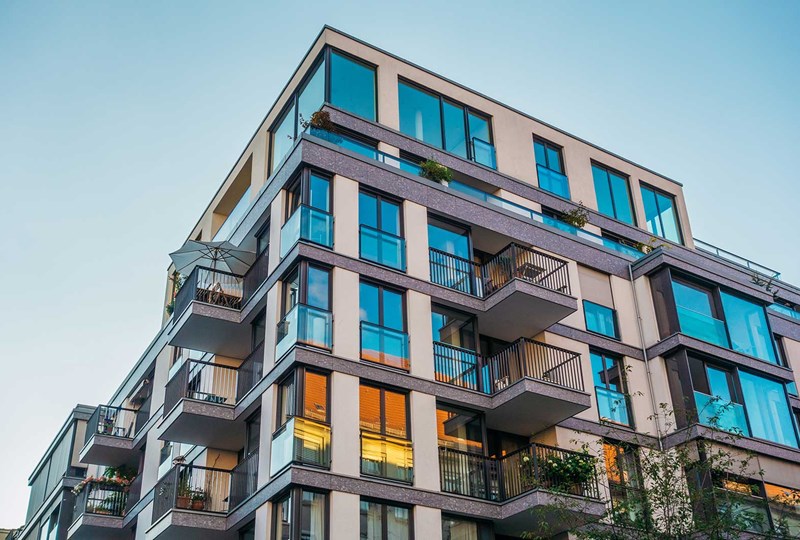
Key Insights
- There are distinct differences between condos, townhomes, apartments and lofts, and it’s important to determine which one best matches your needs.
- Condos and apartments are similar, where the resident has their own bedrooms and bathrooms, but shares common areas — like hallways and entrances. The main difference is that apartments are rented and condos are owned.
- A townhouse is like a condo, but includes land below and around the property. They typically share walls with neighbors, but don’t necessarily share entrances or hallways.
- Lofts are often large, open spaces that have been converted for residential use. They can be available in condos or apartments.
You’re ready to take the next step in your homeownership journey. You can even picture yourself shopping for new decor to furnish your new condo — or will it be an apartment? Or a townhome? Or a loft?
The differences between these four types of homes are distinct. Here are tips to help you make a confident decision about whether a condo, apartment, townhouse or loft is right for you.
What is a condo and how does it differ from an apartment?
A condo, also known as a condominium, is a private residential unit that is surrounded by commonly-owned areas. Condo owners have the freedom to make decisions within the space they own, including:
- Painting the interior walls
- Replacing appliances
- Changing the flooring
Although a condo owner in many cases has creative and legal ownership over their individual unit, the space surrounding their unit is jointly owned. Shared spaces and amenities such as hallways, fitness facilities and security systems are maintained by the homeowner’s association (HOA). The HOA also enforces special condo rules or regulations within the complex. Keep in mind, condo residents pay monthly fees to their HOA in exchange for these conveniences. Check with the HOA or your agent to confirm what’s included.
Outwardly, condos and apartments can appear very similar. However, the difference between a condo and an apartment is how they are owned and managed:
- Condos are sold to individuals who often have complete ownership of their condo units; the entire condo complex is overseen by the HOA in many cases.
- An apartment complex is owned by an individual or group that rents apartment units to tenants; each unit is rented for a period of time agreed upon in a lease.
Think condo life might be right for you? Start your condo search across Minnesota and western Wisconsin.
What is the difference between a townhome and a condo?
Townhome and condo owners typically both have ownership over their personal housing units, and they both pay monthly fees toward general maintenance and upkeep of common areas. The distinction between a townhome and a condo often lies in the boundaries of ownership.
As previously explained, a condo ownercan in many cases expect to have ownership over the elements that are found solely within the interior walls of their unit.
In a townhome:
- Ownership typically includes the housing unit and the ground beneath the unit.
- In many townhouse properties, the owner also has control over exterior components like the roof, driveway and yard.
Where are townhomes typically located?
Because the plot of land below the townhome is usually the owner’s property, townhouses are often constructed in suburban areas and other high-demand locations where lots and land are readily available. Check out available townhomes in Minnesota and western Wisconsin.
What are the benefits of living in a condo or a townhouse?
A condo may be the best purchase for you if:
- You’re community-focused. Condo entrances may be shared and condo units are often close to one another. Whether you wave hello to your neighbor while picking up the mail or get to know a fellow resident in the elevator, condo living can provide an instant sense of community that other types of housing can’t.
- You want to explore a variety of styles. Another exciting condo trait is that they come in all shapes and sizes. Unlike townhouses (which are typically constructed as a series of units linked together by common walls), condos tend to come in a variety of architectural styles, ranging from sky-rise units to renovated old mansions to detached, single-level properties.
- You like low-maintenance living. When living in a condo, you won’t typically be responsible for mowing the lawn, shoveling the walkways or vacuuming the shared property spaces.
Meanwhile, a townhouse could be the right choice if:
- You want to have a bit of green space. Most townhouses will have a small yard that you can call your own. Whether you want to grow your own flowers and vegetables or have a backyard fit for grilling, townhouses offer the outdoor lawn that condos typically can’t.
- You want a dedicated entrance, but don’t mind living close to others. Many townhome communities have shared amenities and even shared walls, so you may meet fellow residents at the pool or clubhouse, or as you enter and exit your property — but you typically won’t share an elevator ride or garage with anyone.
What is a loft? Where are they typically located?
Lofts are large, open, adaptable spaces that have been converted for residential use. Many lofts have exposed fixtures, huge natural light sources and flexible layouts with minimal walls. These apartment-like units are typically, but not always, found in urban settings.
Lofts can be apartments or condos — meaning they can be available for purchase or for rent. In recent years, old warehouses, factories and mills have been rezoned as apartments and condos in Minneapolis, St. Paul and other towns with a history of industry.
You’ll have to do a bit of research to buy and live in one of these unique units, but you can start by looking at available properties in the following areas where lofts are commonly found:
- North Loop
- Downtown St. Paul
- Northeast Minneapolis
Find the features that are right for you
Committing to a property is filled with choices. Do you prefer a community-oriented condo? An apartment with a renewable lease? A townhome with a yard to call your own? Or a quirky loft with the original brick as a focal point?
A REALTOR® can help match you with a property that has features to suit your needs. Reach out to Edina Realty or your agent to get your questions answered and arrange the next steps in your homeowner journey.








 ©2026 Prosperity Home Mortgage LLC®. (877) 275-1762. 3060 Williams Drive, Suite 600, Fairfax, VA 22031. All first mortgage products are provided by Prosperity Home Mortgage, LLC®. Not all mortgage products may be available in all areas. Not all borrowers will qualify. NMLS ID #75164 (For licensing information go to: NMLS Consumer Access at
©2026 Prosperity Home Mortgage LLC®. (877) 275-1762. 3060 Williams Drive, Suite 600, Fairfax, VA 22031. All first mortgage products are provided by Prosperity Home Mortgage, LLC®. Not all mortgage products may be available in all areas. Not all borrowers will qualify. NMLS ID #75164 (For licensing information go to: NMLS Consumer Access at